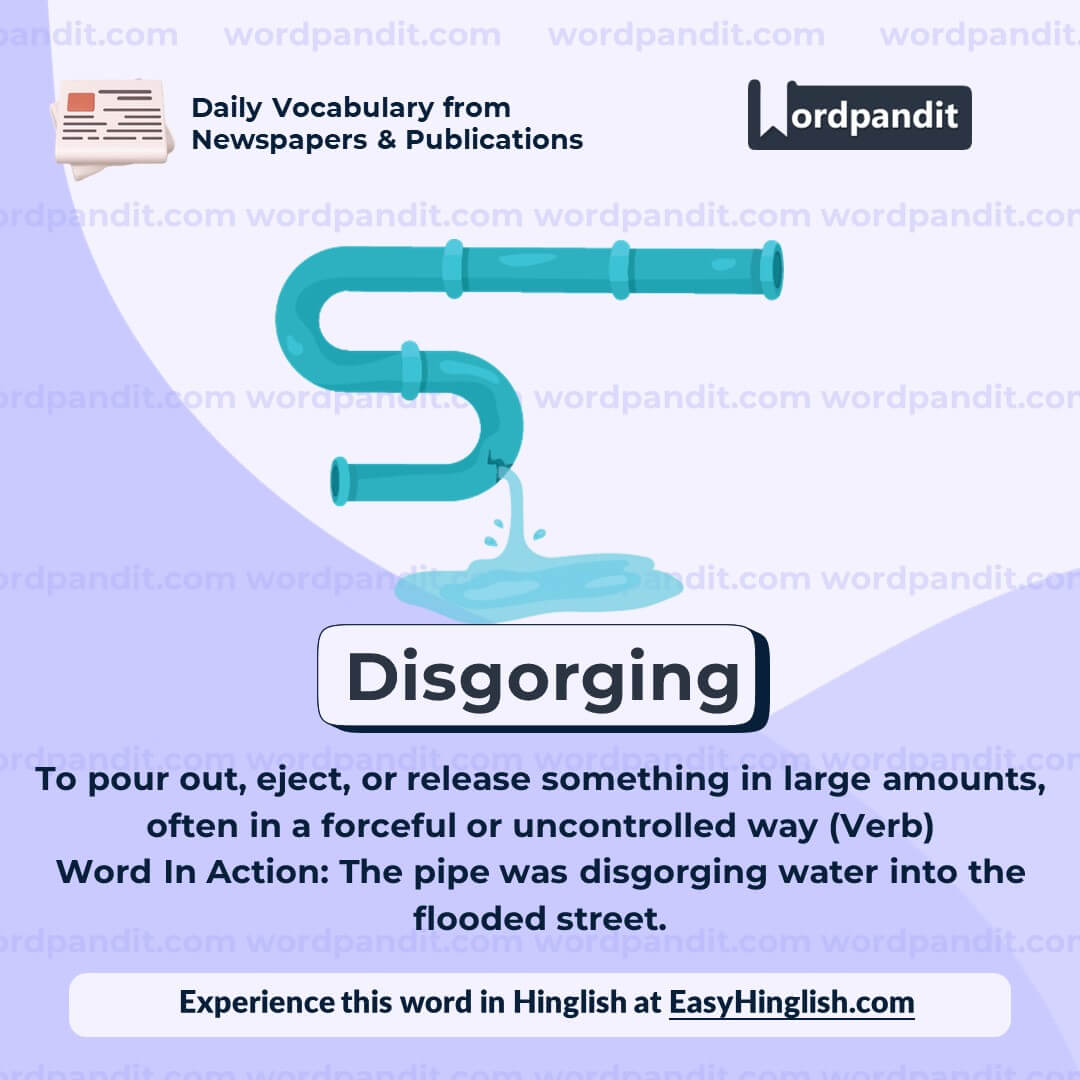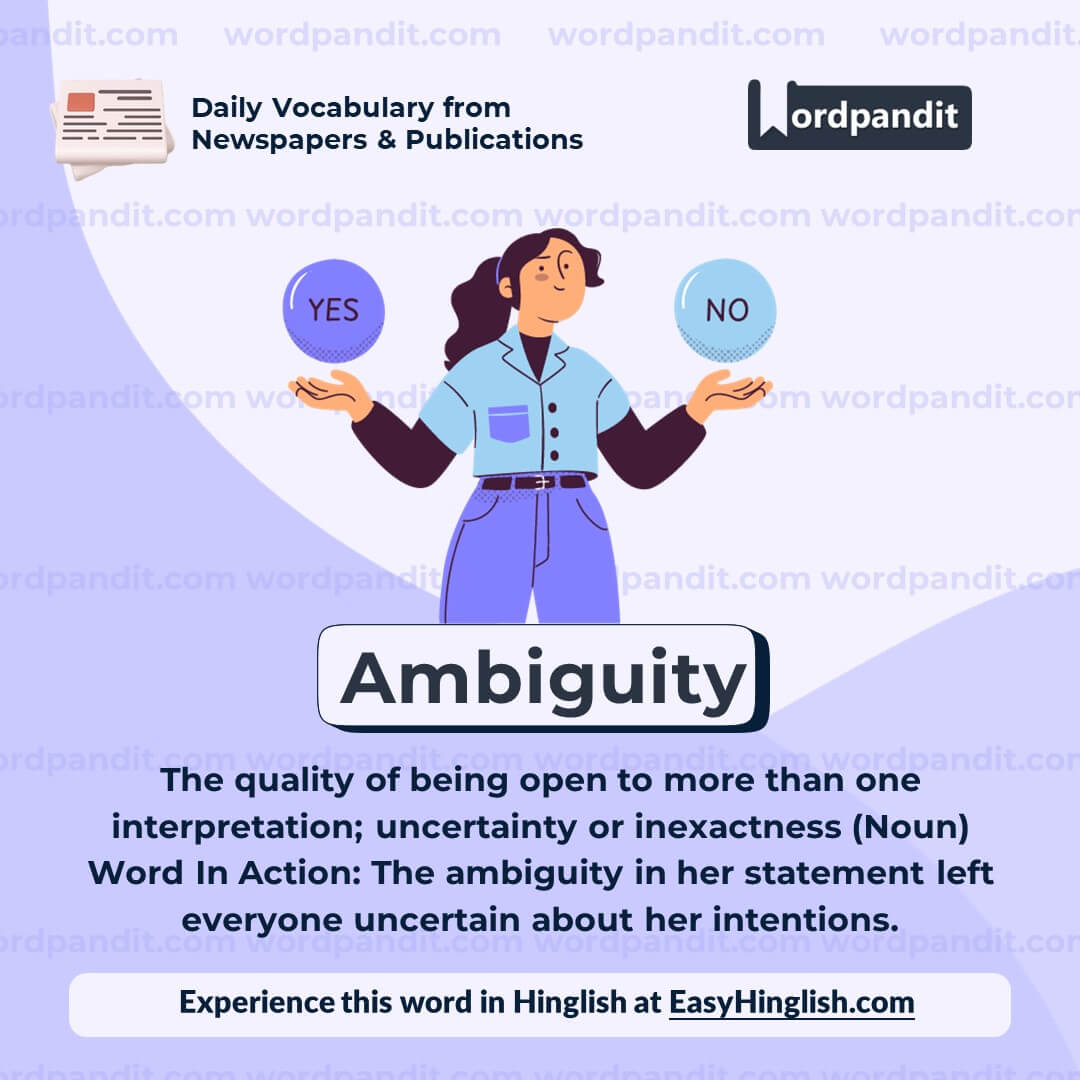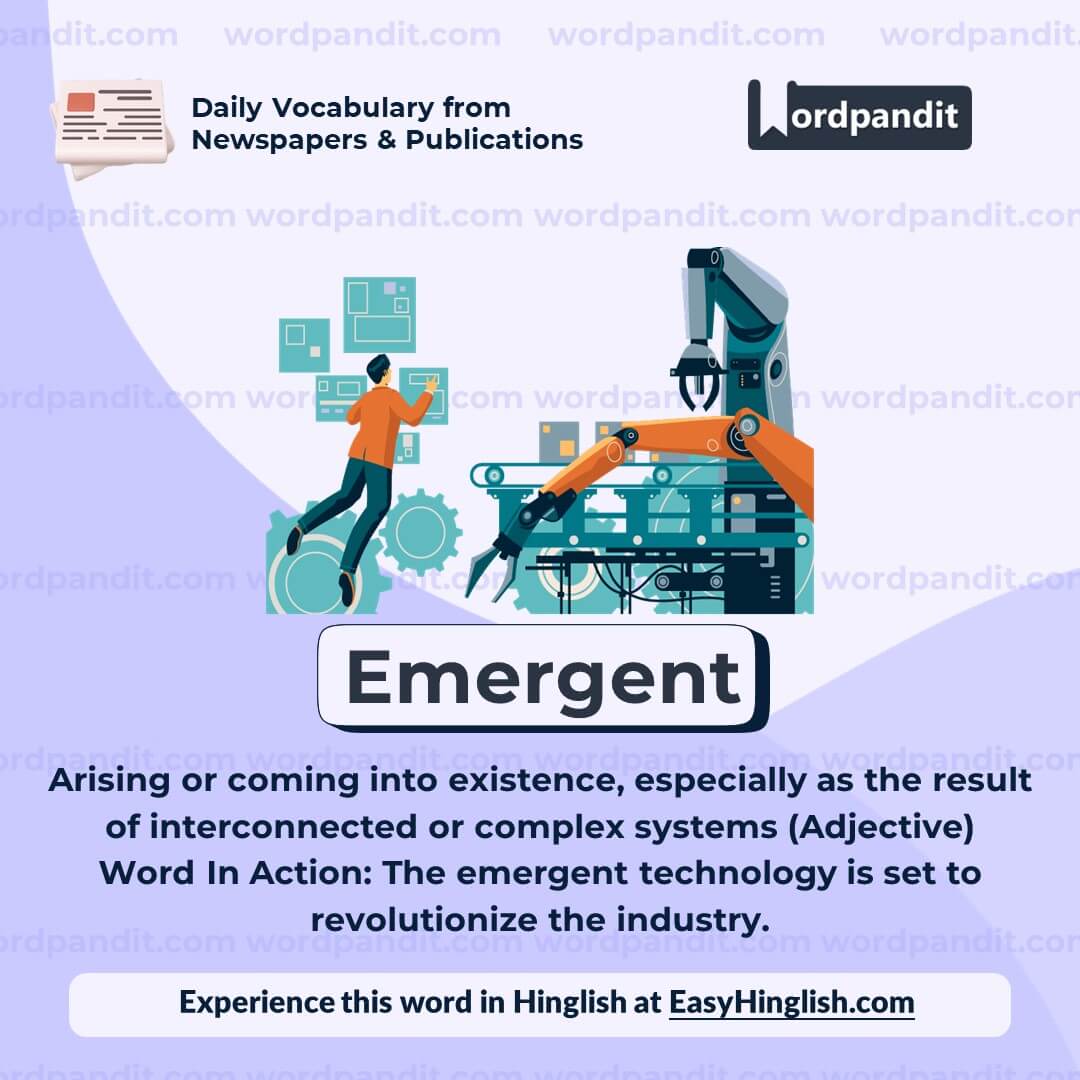Daily Vocabulary from International Newspapers and Publications
Expand Your Vocabulary with Wordpandit’s Global Vocabulary Hub
At Wordpandit, we are committed to helping you develop a truly global vocabulary by drawing from some of the most respected international publications. This section is designed to keep you ahead of the curve by introducing you to words that define global conversations and trends.
The Power of Global Sources
To help you think and communicate on a global scale, we curate vocabulary from renowned international sources, such as:
- The New York Times
- The Washington Post
- BBC
- The Guardian
- The Economist
- Scientific American
- Psychology Today
- And many more...
Stay Global, Stay Competitive
Our daily updates from international publications ensure you are consistently exposed to new words that reflect global news and developments, making sure your vocabulary is not only current but also globally relevant.
Enhance Your Global Perspective
Whether you’re preparing for international exams, aiming to excel in global business communication, or want to enhance your language skills for personal growth, Wordpandit offers the resources you need to thrive in a global context.
Effective Learning, Global Reach
Our learning methodology combines global examples, memory aids, and interactive activities, allowing you to internalize new words effectively and apply them in real-world scenarios.
Begin Your Global Vocabulary Journey Now!
Why Choose Wordpandit?
Practical Learning: Focus on words you'll actually encounter in real-world reading, enhancing your comprehension and communication skills.
Diverse Content: From current affairs to scientific breakthroughs, our varied sources expose you to vocabulary across multiple domains.
Effortless Integration: Make Wordpandit a part of your daily routine. Just a few minutes each day can significantly boost your lexicon over time.
Your Path to Vocabulary Mastery
- Visit our Daily Vocabulary section regularly
- Explore new words and their usage in context
- Practice incorporating these words into your own writing and speech
- Track your progress as your vocabulary expands
Start Your Journey Today
Embark on your vocabulary enhancement journey with Wordpandit. By consistently engaging with our daily posts, you'll build a robust vocabulary that serves you well in academic, professional, and personal contexts.
Remember, a word a day keeps linguistic limitations at bay. Make Wordpandit your daily companion in the quest for vocabulary excellence!
WORD-1: Hoarded
Context:
"In suburbs across the nation, homes filled to the rafters with hoarded junk are common enough to have an ironic idiom: gomi-yashiki (trash-mansions)." - Aeon
Explanatory Paragraph:
The word "hoarded" refers to the act of accumulating and storing items, often in excessive amounts, due to an unwillingness or inability to part with them. This behavior can sometimes lead to cluttered or overwhelming environments, as highlighted in the context of homes filled with "hoarded junk." The term can also imply emotional or psychological attachment to the stored items.
Meaning: To accumulate and store items excessively, often secretively or obsessively. (Verb)
Pronunciation: hohr-did
Difficulty Level: ⭐⭐⭐ Intermediate
Etymology: The word "hoarded" originates from the Old English word "hord," meaning a hidden treasure or store, which itself comes from the Proto-Germanic "huzdam." Over time, it came to describe the act of amassing goods.
Synonyms & Antonyms:
Synonyms: Accumulated, amassed, stockpiled, collected
Antonyms: Dispersed, discarded, scattered, relinquished
Usage Examples:
- The old man hoarded newspapers in his attic for over 50 years.
- She hoarded supplies during the lockdown, fearing shortages.
- Books and magazines were hoarded in every corner of the small apartment.
- The dragon hoarded gold and jewels in its lair, guarding them jealously.
Cultural Reference:
"The reality TV series 'Hoarders' vividly depicts the struggles of individuals who hoard excessively, turning their homes into unlivable spaces. It highlights the psychological complexities behind hoarding behaviors." - Popular Media
Think About It:
What drives people to hoard, and how do societal values around possessions influence this behavior?
Quick Activity:
Look around your room and identify items you may have "hoarded." Reflect on why you keep them and decide whether they are truly necessary.
Memory Tip:
Remember "hoarded" by associating it with "horde" (a group). Just as a horde gathers together, a hoard involves gathering and keeping items in one place.
Real-World Application:
The concept of hoarding is not just limited to individuals but can also apply to organizations or governments stockpiling resources such as medical supplies, fuel, or food during crises.
WORD-2: Disgorging
Context:
"And in areas where space is limited, cluttered residences and shops will often erupt, disgorging things onto the street in a semi-controlled jumble so ubiquitous that urban planners have a name for it:" - Aeon
Explanatory Paragraph:
The word "disgorging" refers to the act of expelling or ejecting something in large quantities, often suddenly and uncontrollably. It can describe physical objects being poured out or metaphorical situations like ideas or emotions being expressed forcefully. In this context, it describes clutter being pushed out onto the street in an overflow.
Meaning: To pour out, eject, or release something in large amounts, often in a forceful or uncontrolled way. (Verb)
Pronunciation: dis-GOR-jing
Difficulty Level: ⭐⭐⭐ Intermediate
Etymology: Derived from Old French "desgorgier," meaning "to empty or pour out," based on the Latin "gurgus," meaning "throat."
Synonyms & Antonyms:
Synonyms: eject, expel, emit, pour out, unload
Antonyms: contain, retain, absorb, hold in
Usage Examples:
- The pipe burst, disgorging water into the basement.
- The truck stopped suddenly, disgorging a load of gravel onto the road.
- At the conference, the speaker began disgorging ideas faster than the audience could take notes.
- The volcano erupted, disgorging molten lava and ash into the atmosphere.
Cultural Reference:
"Disgorging" is often used in descriptions of natural disasters, such as volcanic eruptions or floods, to emphasize the uncontrollable force of nature. It evokes vivid imagery in literature and media to describe dramatic or chaotic scenes.
Think About It:
How does the imagery of "disgorging" enhance the description of overflowing situations, whether physical or abstract?
Quick Activity:
Think of a chaotic scene you’ve witnessed (e.g., a festival, a crowded market). Write a sentence using "disgorging" to describe the scene.
Memory Tip:
Imagine a bottle being tipped over, disgorging its contents forcefully. The image of a sudden, overwhelming flow will help you remember the meaning of "disgorging."
Real-World Application:
"Disgorging" can describe scenarios in logistics, such as unloading goods from a truck, or in storytelling to vividly depict chaotic events. It's also common in environmental descriptions, like rivers disgorging into the ocean or factories disgorging smoke into the air.
WORD-3: Ambiguity
Context:
"For Anouchka Grose, a psychoanalyst and author who has brought her specialism to bear on such topics as fashion, vegetarianism and eco-anxiety, this tolerance of ambiguity is precisely what makes." - Aeon
Explanatory Paragraph:
The word "ambiguity" refers to the quality of being open to multiple interpretations or having an unclear or uncertain meaning. It often arises in language, ideas, or situations where precise meaning is hard to determine, allowing for various perspectives. Tolerating ambiguity can involve embracing uncertainty or complexity without needing definitive answers.
Meaning: The quality of being open to more than one interpretation; uncertainty or inexactness. (Noun)
Pronunciation: am-bih-GYOO-ih-tee
Difficulty Level: ⭐⭐⭐ Intermediate
Etymology: The word "ambiguity" comes from the Latin "ambiguitas," meaning "double meaning, uncertainty," derived from "ambiguus" (having double meanings or doubtful) and the verb "ambigere," meaning "to wander" or "to go about."
Synonyms & Antonyms:
Synonyms: Vagueness, uncertainty, equivocation, indistinctness
Antonyms: Clarity, precision, certainty, explicitness
Usage Examples:
- The ambiguity in her instructions left the team unsure about how to proceed.
- Ambiguity in the law allows for various interpretations by different parties.
- The novel's ending was full of ambiguity, leaving readers to decide the character's fate.
- His ambiguous answer created ambiguity about his true intentions.
Cultural Reference:
"In William Shakespeare’s plays, ambiguity is often used to create tension and complexity in characters, such as Hamlet's indecision and conflicting emotions." - Classic Literature
Think About It:
How does ambiguity in communication impact relationships, both positively and negatively?
Quick Activity:
Write a sentence that contains intentional ambiguity and share it with a friend. See how they interpret it and discuss why their interpretation differs from yours.
Memory Tip:
Remember "ambiguity" by linking it to "ambidextrous," which refers to using both hands. Just like ambiguity, it involves dual possibilities or interpretations.
Real-World Application:
Ambiguity is often found in contract language, creative works, and marketing strategies. While it can spark creativity and discussion, it’s also a reason for disputes when clear terms are required.
WORD-4: Ecstatic
Context:
"This is an ecstatic, emergent complexity, born less from planning than from organic growth, from the inevitable chaos of lives being lived." - Aeon
Explanatory Paragraph:
"Ecstatic" describes a state of overwhelming joy, intense delight, or rapture. It conveys a feeling of being completely carried away by happiness or excitement. In this context, it highlights the exuberant and almost euphoric nature of spontaneous complexity arising from life's inherent chaos.
Meaning: Feeling or expressing overwhelming happiness or joyful excitement. (Adjective)
Pronunciation: ek-STAT-ik
Difficulty Level: ⭐⭐ Beginner to Intermediate
Etymology: Derived from the Greek word "ekstasis," meaning "standing outside oneself," which conveys an out-of-body experience associated with intense joy or emotion.
Synonyms & Antonyms:
Synonyms: overjoyed, elated, euphoric, jubilant, rapturous
Antonyms: miserable, dejected, sorrowful, despondent
Usage Examples:
- The team was ecstatic after their unexpected victory in the championship.
- She was ecstatic to receive the acceptance letter from her dream university.
- As the fireworks lit up the night sky, the crowd erupted in ecstatic cheers.
- The artist was ecstatic upon hearing the standing ovation from the audience.
Cultural Reference:
The word "ecstatic" is often used in literature and film to describe moments of pure joy or transformative experiences. For example, in music, Beethoven’s "Ode to Joy" can be considered an ecstatic celebration of human unity and triumph.
Think About It:
What experiences in your life have made you feel truly ecstatic? How would you describe those moments using vivid language?
Quick Activity:
Write a short paragraph describing a time when you felt ecstatic. Use sensory details to bring your emotions to life.
Memory Tip:
Imagine the word "ecstatic" as a person jumping up and down with excitement, arms raised in joy. The image of uncontainable happiness will help you remember its meaning.
Real-World Application:
"Ecstatic" is commonly used to describe emotions in personal, artistic, or celebratory contexts. It’s an excellent choice when you want to convey a high level of enthusiasm, whether describing a sports victory, an artistic triumph, or a moment of personal achievement.
WORD-5: Emergent
Context:
"This is an ecstatic, emergent complexity, born less from planning than from organic growth, from the inevitable chaos of lives being lived." - Aeon
Explanatory Paragraph:
The word "emergent" describes something that is in the process of becoming visible, significant, or coming into existence, often as a result of complex systems or interactions. It suggests a dynamic and organic development rather than something pre-planned or fixed. In the context provided, "emergent complexity" refers to spontaneous, intricate systems arising from natural, chaotic processes rather than deliberate organization.
Meaning: Arising or coming into existence, especially as the result of interconnected or complex systems. (Adjective)
Pronunciation: ih-MER-juhnt
Difficulty Level: ⭐⭐⭐ Intermediate
Etymology: The word "emergent" comes from the Latin "emergentem," meaning "arising, projecting," derived from "emergere" (to rise out or up). It has been used in English since the 17th century to describe things that come into being or prominence.
Synonyms & Antonyms:
Synonyms: Developing, arising, nascent, evolving
Antonyms: Established, static, declining, subsiding
Usage Examples:
- The emergent startup quickly gained traction in the tech industry.
- The artist's work reflects the emergent trends of contemporary society.
- Emergent behaviors in nature, such as bird flocking, are fascinating to observe.
- The community's emergent culture grew organically from shared experiences.
Cultural Reference:
"In urban planning, emergent complexity can be seen in the unplanned development of neighborhoods, where the interaction of people and environment creates unique cultural hubs." - Urban Studies
Think About It:
Can emergent phenomena in technology, like artificial intelligence, ever be fully controlled or understood?
Quick Activity:
Observe a natural system around you, such as a garden or a bustling street. Identify any patterns or complexities that seem to emerge naturally.
Memory Tip:
Link "emergent" to "emerge," imagining something rising or coming to light, like a plant sprouting from the ground.
Real-World Application:
The concept of emergent phenomena is crucial in fields like artificial intelligence, where simple algorithms can lead to complex, unforeseen outcomes when interacting in systems.


















